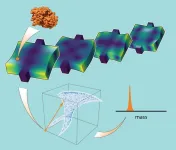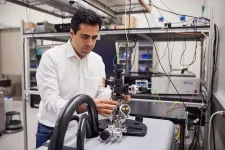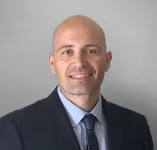(Press-News.org) A majority of Americans worry this year’s general election will be tainted by fraud, according to a recent NPR/PBS News/Marist poll released earlier this month—an ominous indication of the state of democracy in the U.S.
“When citizens lose trust in the electoral process, they may question the legitimacy of elected officials and the institutions they represent, which undermines the foundational principle that government authority is derived from the will of the people,” said Lauren Prather, an associate professor of international relations at the UC San Diego School of Global Policy and Strategy. “And as we saw with the Jan. 6 insurrection in the U.S., people's beliefs about elections—whether it was free and fair, whether there was fraud, whether they trust the outcome—are incredibly important to peace and security, not just to democracy.”
The U.S. is not alone in showing signs of democratic backsliding. Threats to democracy are occurring all over the globe, and UC San Diego scholars, including Prather, are taking a deep dive into understanding the growing phenomena.
They are part of the Future of Democracy, an initiative of the UC Institute on Global Conflict and Cooperation (IGCC) that is co-directed by Emilie Hafner-Burton, professor at the UC San Diego School of Global Policy and Strategy, and Christina Schneider, professor in the Department of Political Science at the UC San Diego School of Social Sciences.
The initiative brings together multiple disciplines and perspectives from across the University of California to better understand why illiberal regimes—governing systems that hide their nondemocratic practices behind formally democratic institutions and procedures—are increasingly on the rise and what the consequences are for populations around the globe.
Democratic backsliding is now harder to see and counter
“In the past, the standard route from democracy to autocratic rule came through the military coup. Now, duly elected leaders are using executive offices to erode democracy from within,” said Stephan Haggard, distinguished research professor at the School of Global Policy and Strategy and research director for Democracy and Global Governance at IGCC. “Such actions—for example, against the judiciary or the integrity of the electoral system—are harder to see and counter.”
This phenomenon of “democratic backsliding” has occurred in a variety of governments—from Poland to Hungary, Brazil, Venezuela and the Philippines. And, as the events of Jan. 6 showed, even the U.S. is vulnerable.
Yet, illiberal rule has also gone global, influencing international organizations which were once a mainstay of international cooperation. The researchers have identified three trends they find particularly worrisome:
First: authoritarian great powers—China and Russia—are seeking to build coalitions in multilateral organizations that would challenge prevailing norms. Institutions like the UN’s Human Rights Council are particularly vulnerable.
Second: authoritarian leaders are using regional organizations to their advantage or even forming their own regional clubs, like the Shanghai Cooperation Organization and Russia’s Eurasian Economic Union.
Finally: democratic regional organizations such as the European Union and Organization of American States now must contend with backsliding members—Poland and Hungary, Venezuela and Nicaragua—who openly flaunt democracy and rule-of-law norms.
Autocracies often leverage international organizations to consolidate power
Several faculty from the Future of Democracy initiative have recently published studies in a special issue of the Review of International Organizations, one of the most prestigious academic journals in the field of international relations.
Four UC San Diego-affiliated authors developed a study featured in the journal that explores how illiberal regimes navigate international organizations and what the consequences are for international cooperation and domestic politics.
“Autocracies, backsliding democracies and illiberal political movements often leverage international organizations to protect themselves from internal and external challenges, including pressures to democratize,” said Hafner-Burton, coauthor of the study. “We find that participation in illiberal organizations reduces the prospects for political liberalization and democratization.”
In addition to Hafner-Burton, coauthors of the paper “Illiberal regimes and international organizations” include Christina Cottiero of the University of Utah, who is a UC San Diego alum from the Department of Political Science, as well as Haggard, Prather and Schneider.
Dictators and autocrats hide behind symbolic laws that promote “good governance”
A separate study from Hafner-Burton, Schneider and Jon Pevehouse of the University of Wisconsin-Madison shows how autocratic regional organizations, such as the African Union (A.U.), adopt formal "good governance" mandates, such as human rights and anti-corruption policies, but that these measures are largely symbolic or are applied to non-members only.
“A particular irony of our study is that these mandates often arise from external pressure from democratic partners, such as the European Union, but end up having little effect,” said Schneider.
The study utilizes data from 48 primarily autocratic regional organizations between 1945-2015.
Fake or “zombie” election monitors help prop up autocracies
The concluding study in the Review of International Organization focuses on the rise of low-quality election monitors, often referred to as "zombie" election monitors. These “fake” election monitors have been shown to validate flawed elections and undermine credible election assessments, confusing voters and allowing authoritarian regimes to legitimize their rule.
The paper, authored by Prather, Cotteria and Sarah Sunn Bush of the University of Pennsylvania, includes recent data that reveals the presence of these questionable monitoring entities has surged, from 23% of elections observed by such groups in 2000, to a staggering 39% by 2020.
Their role in validating flawed elections is increasingly undermining high-quality monitors—international observers committed to upholding the principles of free and fair elections.
An example of this alarming trend occurred during the 2020 parliamentary election in Azerbaijan. While the Organization for Security and Cooperation in Europe (OSCE) reported that the election lacked genuine competition, low-quality monitors from the authoritarian regional organization, the Commonwealth of Independent States (CIS) that includes Russia, Belarus and other nation states in Eurasia, praised the election as "competitive and free," directly contradicting the OSCE's findings.
‘Democracy and its Discontents’
Recently, faculty from the Future of Democracy initiative discussed the challenges facing democracy in a miniseries of podcasts produced by IGCC. Listen to all episodes of “Democracy and its Discontents.” Topics include the allure of strongmen, the rise of anti-immigrant rhetoric and how to move forward with hope.
END
A new kind of authoritarianism: Democracy in decline at home and abroad
‘Future of Democracy’ faculty sound the alarm on threats to democracy with new research
2024-10-22
ELSE PRESS RELEASES FROM THIS DATE:
Performance in physical tests can help manage treatment for metastatic lung cancer
2024-10-22
A study of patients with metastatic lung cancer by researchers based in Brazil and the United States has found that their performance in simple physical tests such as sitting down, standing and walking can help physicians arrive at a prognosis and approach to treatment.
An article on the study is published in the European Journal of Clinical Investigation.
The findings also included identification in the volunteers’ blood plasma of two substances – serine and M22G – with the potential to become biomarkers capable of indicating which patients are most likely to respond to chemotherapy.
The study was supported by FAPESP (projects 16/20187-6 and 19/17009-7), ...
Expanding access to weight-loss drugs could save thousands of lives a year
2024-10-22
New Haven, Conn. — Expanding access to new, highly effective weight-loss medications could prevent more than 40,000 deaths a year in the United States, according to a new study led by researchers at Yale School of Public Health and the University of Florida.
The findings highlight the critical need to remove existing barriers that are hindering people’s access to effective weight loss treatments and impeding public health efforts to address the national obesity crisis, the researchers said. According to the U.S. Centers for Disease Control and Prevention, about 74% of Americans are considered overweight, with about 43% of those individuals ...
Harnessing science to tackle global crises
2024-10-22
In a paper published in PLOS Sustainability and Transformation, an international team of researchers looked at how science could play a more active role in managing crises. The paper builds on the outcomes of the international conference “What Role for Science in Crisis Times? Outlook in the Health, Environment, and Agriculture Interconnected Areas”, held in Montpellier in 2022.
To enhance science’s contribution to crisis management, the paper emphasises the need for interdisciplinarity, where science is integrated across disciplines, and transdisciplinarity, which incorporates various societal actors and stakeholders. By co-designing and co-producing ...
Caltech's new fingerprint mass spectrometry method paves the way to solving the proteome
2024-10-22
Caltech scientists have developed a method driven by machine learning that allows them to accurately measure the mass of individual particles and molecules using complex nanoscale devices. The new technique opens the possibility of using a variety of devices for the measurement of mass and, therefore, the identification of proteins, and could pave the way to determining the sequence of the complete proteome, the collection of all the proteins in an organism.
Proteins are the engines of living systems. Which proteins are made, ...
Invasive flathead catfish impacting Susquehanna’s food chain, researchers find
2024-10-22
UNIVERSITY PARK, Pa. — Flathead catfish — native to the Mississippi River basin — were first detected in the Susquehanna River in Pennsylvania in 2002, according to the U.S. Geological Survey. In the two decades since then, the invasive species has spread throughout the river basin. The impact of the large predator on the waterway’s food webs and ecology was unknown, but now a research team is beginning to understand what Susquehanna flatheads are eating and how their presence is affecting native aquatic species in the river.
The findings, which the team said state ...
Javadi receives DOE Early Career Award to study qubit hosts
2024-10-22
NORMAN, OKLA. – Alisa Javadi, Ph.D., professor at the University of Oklahoma School of Electrical and Computer Engineering and the Homer L. Dodge Department of Physics and Astronomy, has received funding from the U.S. Department of Energy Early Career Research Program for research that offers the potential for advancing quantum technology development.
Javadi’s research will test the use of cerium oxide as a host for quantum bits, or qubits. Qubits, the building blocks of quantum computing, need an environment free ...
Obesity Medicine Fellowship created at Pennington Biomedical
2024-10-22
Obesity Medicine Fellowship Created at Pennington Biomedical
Fellowship product of collaboration between Pennington Biomedical Research Center’s Metamor Clinic and Louisiana State University Health New Orleans School of Medicine
FOR IMMEDIATE RELEASE
Oct. 22, 2024
BATON ROUGE – A new Obesity Medicine Fellowship at Pennington Biomedical Research Center is now open for candidate applications. The one-year program is the result of a collaboration between Pennington Biomedical and Louisiana State University Health ...
Structural biology analysis of a Pseudomonas bacterial virus reveals a genome ejection motor
2024-10-22
BIRMINGHAM, Ala. – The viruses that infect bacteria are the most abundant biological entities on the planet. For example, a recent simple study of 92 showerheads and 36 toothbrushes from American bathrooms found more than 600 types of bacterial viruses, commonly called bacteriophages or phages. A teaspoon of coastal seawater has about 50 million phages.
While largely unnoticed, phages do not harm humans. On the contrary, these viruses are gaining increasing popularity as biomedicines to eradicate pathogenic ...
Remote tool developed to helped detect autism and developmental delay in children with limited access to specialists
2024-10-22
A Ukrainian researcher has developed a new digital tool for detecting autism and developmental delay in children. Her research has been published in Cambridge University Press journal Cambridge Prisms: Global Mental Health.
The tool incorporates the basic principles of the Kids’ Development Diagnosis and Determining the Risk of Autism (KiDD) methodology, for children aged 1.5 to 6 years old, into mobile app form. It has the potential to help diagnose children more swiftly and efficiently, which could have major positive ...
Texas Accounting Chair Steven Kachelmeier garners coveted award for scholarship
2024-10-22
Texas Accounting Chair Steven Kachelmeier Garners Coveted Award for Scholarship
AUSTIN, Texas — The American Accounting Association (AAA) presented its Lifetime Achievement Award for Behavioral Accounting Research to Steven Kachelmeier, a professor and chair of the Department of Accounting at The University of Texas McCombs School of Business. Kachelmeier, the Thomas O. Hicks Endowed Chair in Business, accepted this prestigious award during the weekend at the association’s 2024 Accounting ...
LAST 30 PRESS RELEASES:
Scientists show how to predict world’s deadly scorpion hotspots
ASU researchers to lead AAAS panel on water insecurity in the United States
ASU professor Anne Stone to present at AAAS Conference in Phoenix on ancient origins of modern disease
Proposals for exploring viruses and skin as the next experimental quantum frontiers share US$30,000 science award
ASU researchers showcase scalable tech solutions for older adults living alone with cognitive decline at AAAS 2026
Scientists identify smooth regional trends in fruit fly survival strategies
Antipathy toward snakes? Your parents likely talked you into that at an early age
Sylvester Cancer Tip Sheet for Feb. 2026
Online exposure to medical misinformation concentrated among older adults
Telehealth improves access to genetic services for adult survivors of childhood cancers
Outdated mortality benchmarks risk missing early signs of famine and delay recognizing mass starvation
Newly discovered bacterium converts carbon dioxide into chemicals using electricity
Flipping and reversing mini-proteins could improve disease treatment
Scientists reveal major hidden source of atmospheric nitrogen pollution in fragile lake basin
Biochar emerges as a powerful tool for soil carbon neutrality and climate mitigation
Tiny cell messengers show big promise for safer protein and gene delivery
AMS releases statement regarding the decision to rescind EPA’s 2009 Endangerment Finding
Parents’ alcohol and drug use influences their children’s consumption, research shows
Modular assembly of chiral nitrogen-bridged rings achieved by palladium-catalyzed diastereoselective and enantioselective cascade cyclization reactions
Promoting civic engagement
AMS Science Preview: Hurricane slowdown, school snow days
Deforestation in the Amazon raises the surface temperature by 3 °C during the dry season
Model more accurately maps the impact of frost on corn crops
How did humans develop sharp vision? Lab-grown retinas show likely answer
Sour grapes? Taste, experience of sour foods depends on individual consumer
At AAAS, professor Krystal Tsosie argues the future of science must be Indigenous-led
From the lab to the living room: Decoding Parkinson’s patients movements in the real world
Research advances in porous materials, as highlighted in the 2025 Nobel Prize in Chemistry
Sally C. Morton, executive vice president of ASU Knowledge Enterprise, presents a bold and practical framework for moving research from discovery to real-world impact
Biochemical parameters in patients with diabetic nephropathy versus individuals with diabetes alone, non-diabetic nephropathy, and healthy controls
[Press-News.org] A new kind of authoritarianism: Democracy in decline at home and abroad‘Future of Democracy’ faculty sound the alarm on threats to democracy with new research




